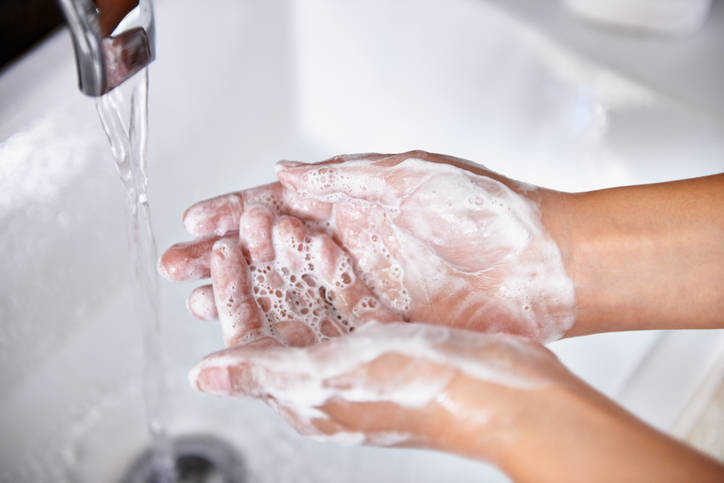Covid-19 causing anxiety

There’s a lot of anxiety about the health and welfare of people throughout the world, including locally since Indiana confirmed six cases of coronavirus within a week.
Clay County Public Health Nurse Kimberly Hyatt recently admitted concerns about the outbreak is a topic people are interested in, saying it’s hard to go out in public and not be approached by someone asking questions about the current epidemic. (The Times will be interviewing Hyatt about this topic for a full local story in the coming week.)
“Good handwashing is the best way to limit exposure,” said Hyatt about using proper hygiene to avoid many contagious health issues like coronavirus, forms of Hepatitis, influenza, and the common cold. “Handwashing for at least 20 seconds with warm water and soap is highly recommended. But if you only have an antibacterial lotion, that will work too.”

Social media is abuzz of activity, with various health organizations using the opportunity to share information about personal hygiene and tips to avoid the virus. American Academy of Pediatrics, the Centers for Disease Control and Prevention, the U.S. Department of Health and Human Services, and the Surgeon General are becoming frequent posts on Facebook and Twitter.
“Did you know that there’s something you can do to help stop the spread of COVID-19?” asks Vice Adm. Jerome M. Adams, M.D., the 20th Surgeon General of the United States, in his Facebook video. “It’s very simple: Properly washing your hands.”
Adams made the video for the U.S. Department of Health and Human Services about how the five steps of proper handwashing can help fight the current outbreak. (See the video on The Times’s Facebook page.)
Handwashing tips are also made available on the Clay Community School Corporation’s Facebook page. Parents and adults are encouraged to lead by example. Superintendent Jeff Fritz provided a tip to use as a 20-second timer during handwashing: Just hum the Happy Birthday song all the way through twice.
Several local businesses have also provided health and hygiene information to their employees, including nursing homes, are taking extra precautions.
Cloverleaf Healthcare has announced there will be no outside activities at this time until further notice, visitors will need to sign in, and anyone with flu-like symptoms is asked not to visit. (Any questions, call 812-446-2309.)
Exceptional Living Center of Brazil & Towne Park is also including a temperature check of people signing in before allowed to visit and restricted visiting hours to ensure the health of residents and staff.
Villas of Holly Brook & Reflections Memory Care are also following several of the above precautions for their staff and employees as well, “because it’s important for everyone’s health.”
As the coronavirus continues to spread around the world and cases in the US increase, and Indiana as well, a lot of concern is being raised with regards to people becoming overwhelmed by the attention in the news and social media about the outbreak.
Rumors of hand sanitizer selling for absorbent prices online are out there, and many shelves in stores are quickly emptying of supplies to fight the virus-like disinfectants to clean all “high-touch” surfaces, such as counters, tabletops, doorknobs, bathroom fixtures, toilets, phones, keyboards, tablets, and bedside tables.
Cleaning agents can include a household disinfectant with a label that says “EPA-approved,” according to the CDC. However, a homemade version can be made using one tablespoon of bleach to one quart of water that works just as well.
Among the fear, many are taking a light-hearted approach to the anxiety about COVID-19 by creating “memes” to share on social media.
A history of COVID-19
On Dec. 31, 2019, the first cases of a new Coronavirus strain were reported in Wuhan, China. Over the span of two months, the virus – also known as COVID-19 by public health experts – has spread around the world. A month later, the World Health Organization (WHO) declared the Coronavirus outbreak a public health emergency of international concern, only the sixth declaration of its kind in WHO history.
The U.S. Department of Health and Human Services also declared it a public health emergency for the United States on the same day.
As of March 10, US Health officials announced 500 or more confirmed cases in the US, with a total of 27 people reported dying from the disease. More than 100,000 cases are reported worldwide in more than 90 countries.
What is Coronavirus
Coronaviruses are a group of viruses that can cause a range of flu-like symptoms, including a runny nose, cough, sore throat, and fever. Some are mild, such as the common cold, while others are more likely to lead to pneumonia. The virus, according to the Centers for Disease Control and Prevention, is usually spread through direct contact with an infected person.
However, it’s unknown how long the new coronavirus can survive on surfaces outside of the body. Research has shown that other coronaviruses can survive on hard surfaces for hours to days.
If an infected person sneezes or coughs on a surface, like a countertop, shopping cart, or even books, the virus could survive. When another person touches that surface, then rubs their eyes, nose, or mouth, they may get sick.
Why is it called Coronavirus
The coronavirus has crown-like spikes on its surface, according to the CDC, including the newly identified strain of the virus.
A total of seven coronaviruses have been officially identified by health officials at the CDC that can infect humans, including the well-known SARS and MERS.
Is there a coronavirus treatment
Currently, there is not a treatment for coronavirus, but patients can be helped with supportive care, like helping them breathe.
Health officials in the US are currently performing a clinical trial for possible treatment.
An antiviral drug called remdesivir, initially developed for possible treatment for Ebola, has previously shown promise in treating other coronaviruses like SARS. Clinical trials of remdesivir are ongoing in China to test its effects on both severe and mild cases of the disease, according to officials with the National Institute of Allergy and Infectious Disease.
